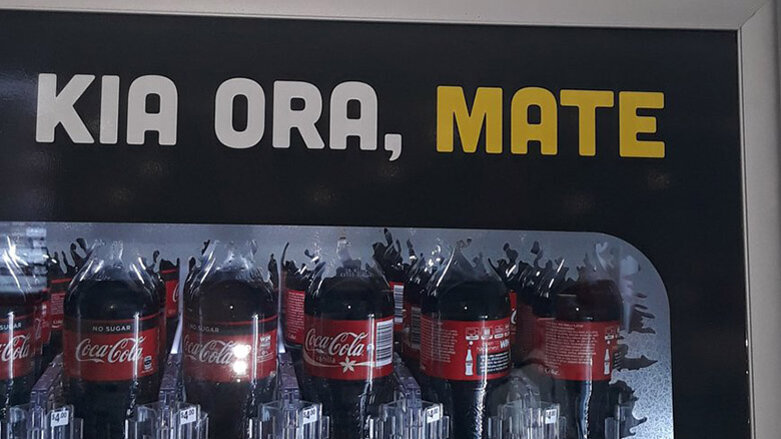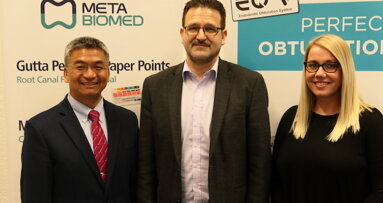AUCKLAND, New Zealand: New Zealand has an oral health problem. Expense is one of the main factors that prevent people from visiting the dentist, and this results, in some instances, in oral health conditions similar to those of developing countries. However, sugar is another major issue, and in a recent statement, the New Zealand Dental Association (NZDA), Te Ao Mārama (the New Zealand Maori Dental Association) and Hāpai te Hauora (Maori Public Health) have criticised the use of the Maori language on Coca-Cola products.
The new marketing ploy by Coca-Cola focuses its sights directly on the New Zealand Maori population by labelling its products with slogans such as “Share a Coke with whānau [family]” and “Share a Coke with kuia [grandma]”. “This has shades of the tobacco industry here—a subversive insidious way to connect with people who suffer a disproportionate amount of dental disease and harm from a public health perspective,” said NZDA sugary drink spokesperson Dr Rob Beaglehole.
According Dr Kirsten Robertson, a senior lecturer in the Department of Marketing at the University of Otago, New Zealand has a significant problem regarding the consumption of sugar-sweetened beverages (SSBs). As reported by Dental Tribune International, New Zealand is the third most overweight nation in the Organisation for Economic Co-operation and Development area, and 17% of adults’ total sugar intake comes from SSBs.
“This corporation which cares nothing for our mokopuna [children], our kuia and kaumātua [seniors], has appropriated our language to make a profit. Worse—they’ve singled out one of the worst areas of inequity in health outcomes—our whānau’s oral health. They should be ashamed,” said Hāpai Te Hauora CEO Selah Hart.
The introduction of a sugar tax is still to be debated in parliament, and direct action to protect some communities from persuasive marketing is also greatly needed. According to the NZDA, 2017–2018 data shows Maori are 1.36 times more likely than non-Maori to have teeth removed as a result of dental caries. According to a 2018 Best Practice Advocacy Centre New Zealand study, it was estimated that, in the Auckland region alone, over 40% of people of Maori, Pacific or Indian ethnicity aged 35–39 years have prediabetes.
“It is beyond unethical and completely irresponsible for a corporate marketing campaign to position itself within the realities of colonised, culturally compromised populations, like Maori, by appropriating our words like ‘whānau’ and ‘kuia’ to entice engagement of our people for their monetary gain at the expense and to the detriment of our people. This practice is shameful and we, Te Ao Mārama denounce and repudiate this behaviour,” said Te Ao Mārama spokesperson Leeann Waaka.
Tags:
STIRLING, UK: Earlier this week, NHS Scotland released new guidance for the prevention and handling of potential respiratory infections in healthcare ...
MÜLHEIM, Germany: Frank Wirtz is the new Sales and Marketing Manager for META BIOMED Europe. In 2016, META BIOMED, a manufacturer of endodontic and ...
Language competency can mean different things to different people. A dentist and dental nurse for example, will use a completely different vocabulary to ...
2013: are you staring into the abyss? Have you a thought out a plan for how you are going to continue growing your business? Are you going to continue doing...
SYDNEY, Australia: Evidence indicates that culturally and linguistically diverse (CALD) communities experience unequal access to oral healthcare services, a...
LONDON, England: A proposed dental voucher scheme has reignited debate over the future of National Health Service (NHS) dentistry in England. The idea, set ...
WHANGANUI, New Zealand: The chronic barriers to oral healthcare in New Zealand have been underscored by the volume of patients with serious oral health ...
SCHAAN, Liechtenstein: Ivoclar Vivadent has announced that it has appointed Patric Frank as its new chief of marketing. Frank, who has been with the company...
JEDDAH, Saudi Arabia: A staggering 1.5 billion people are estimated to suffer from some level of hearing loss globally according to the World Health ...
SYDNEY, Australia: Among the issues arising for small dental practice owners is adhering to regulations that are more applicable to larger institutions such...
Live webinar
Tue. 24 February 2026
1:00 pm EST (New York)
Prof. Dr. Markus B. Hürzeler
Live webinar
Tue. 24 February 2026
3:00 pm EST (New York)
Prof. Dr. Marcel A. Wainwright DDS, PhD
Live webinar
Wed. 25 February 2026
11:00 am EST (New York)
Prof. Dr. Daniel Edelhoff
Live webinar
Wed. 25 February 2026
1:00 pm EST (New York)
Live webinar
Wed. 25 February 2026
8:00 pm EST (New York)
Live webinar
Tue. 3 March 2026
11:00 am EST (New York)
Dr. Omar Lugo Cirujano Maxilofacial
Live webinar
Tue. 3 March 2026
8:00 pm EST (New York)
Dr. Vasiliki Maseli DDS, MS, EdM



 Austria / Österreich
Austria / Österreich
 Bosnia and Herzegovina / Босна и Херцеговина
Bosnia and Herzegovina / Босна и Херцеговина
 Bulgaria / България
Bulgaria / България
 Croatia / Hrvatska
Croatia / Hrvatska
 Czech Republic & Slovakia / Česká republika & Slovensko
Czech Republic & Slovakia / Česká republika & Slovensko
 France / France
France / France
 Germany / Deutschland
Germany / Deutschland
 Greece / ΕΛΛΑΔΑ
Greece / ΕΛΛΑΔΑ
 Hungary / Hungary
Hungary / Hungary
 Italy / Italia
Italy / Italia
 Netherlands / Nederland
Netherlands / Nederland
 Nordic / Nordic
Nordic / Nordic
 Poland / Polska
Poland / Polska
 Portugal / Portugal
Portugal / Portugal
 Romania & Moldova / România & Moldova
Romania & Moldova / România & Moldova
 Slovenia / Slovenija
Slovenia / Slovenija
 Serbia & Montenegro / Србија и Црна Гора
Serbia & Montenegro / Србија и Црна Гора
 Spain / España
Spain / España
 Switzerland / Schweiz
Switzerland / Schweiz
 Turkey / Türkiye
Turkey / Türkiye
 UK & Ireland / UK & Ireland
UK & Ireland / UK & Ireland
 Brazil / Brasil
Brazil / Brasil
 Canada / Canada
Canada / Canada
 Latin America / Latinoamérica
Latin America / Latinoamérica
 USA / USA
USA / USA
 China / 中国
China / 中国
 India / भारत गणराज्य
India / भारत गणराज्य
 Pakistan / Pākistān
Pakistan / Pākistān
 Vietnam / Việt Nam
Vietnam / Việt Nam
 ASEAN / ASEAN
ASEAN / ASEAN
 Israel / מְדִינַת יִשְׂרָאֵל
Israel / מְדִינַת יִשְׂרָאֵל
 Algeria, Morocco & Tunisia / الجزائر والمغرب وتونس
Algeria, Morocco & Tunisia / الجزائر والمغرب وتونس
 Middle East / Middle East
Middle East / Middle East












































To post a reply please login or register